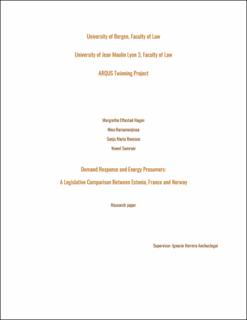Demand Response and Energy Prosumers: A Legislative Comparison Between Estonia, France and Norway
Report

Åpne
Permanent lenke
https://hdl.handle.net/11250/3026555Utgivelsesdato
2022Metadata
Vis full innførselSamlinger
- Faculty of Law [2479]
Sammendrag
By now, there is a sufficient amount of binding EU legislation enabling the incorporation of energy prosumers and demand response in the national regulations of the Member States. Nevertheless, the Member States are just now transposing the Recast Electricity Regulation and Electricity Directive into their domestic laws for which reason demand-side management and the empowering of consumers has been delayed. Because Norway has not accepted the Clean Energy Package, the relevant EU legislation is not mandatory for them to implement. As for the EU Member States, regardless of the binding rules, they have some discretion in designing the conditions for aggregation, energy prosumers and flexibility services. This results in an array of different regulations in Europe, with some more open to new competitors while others not.
Looking into how France, Estonia and Norway (a non-EU state) have regulated these fields showcases that European jurisdictions are still in very different stages of introducing active consumers and independent aggregators to the electricity markets. While France has been leading the game for years by now with actual energy communities and consumers concluding aggregation contracts with their energy suppliers, Estonia has just made these options legally available and is awaiting the emergence of new market participants. Even though Norway produces a lot of energy, there doesn't seem to be a lot of interest in the prosumer-movement. There is not a lot of legislation regarding this, and the existing legislation is not very developed compared to other European countries. The most likely reasons for this are the already low electricity prices and the overwhelming dominance of renewable energy in Norway. Therefore, there is no strong need for greenification and little motivation for consumers becoming prosumers.
When it comes to the reviewed legal challenges, the ones still prevalent when it comes to prosumers are enabling consumers to become prosumers without triggering the European Union competition law and without sacrificing the consumers’ right to property. The problem regarding the EU competition law and its state aid regulation has been mostly eliminated though when it comes to prosumers. The issues that States may have to face in the future might be mostly related to protecting the consumers’ personal data when they become prosumers, but also when they choose not to become one. Regarding demand response, the first obstacle is still non-sufficient regulation, as Norway has none and Estonia is still in the process of adopting further rules. Before there are binding rules for network operators to accept flexibility services, whether independent or aggregated, the new market participants won’t be allowed entrance on the market or will be rendered unsuccessful competitors. Furthermore, independent aggregation must be authorised, since retailers still don’t have sufficient interest in becoming aggregators. On the other hand, all markets are moving towards facilitating smaller bids with shorter duration and other more flexible conditions. This is partly triggered by pan-European network codes and regional cooperation projects which aim to harmonise the European electricity markets. Moreover, consumers’ rights as energy prosumers have been codified and therefore expanded which also means that consumers are a step closer to playing a part in the energy transition. On the whole, it seems that things are getting better in time and a lot has changed since the analysis by Zancanella et al in 2017.
With the threat of climate change becoming more real every year, so increases the urgency for an energy transition. Involving consumers in the transition and initiating a bottom-up movement in facilitating clean, yet unstable, renewable energy on the market and managing the grid through energy efficiency and demand-side management instead of network expansion is of utmost importance. For consumers to be proactive in the energy transition, governments must create conditions for participation in the electricity markets which at the same time are in accordance with the capabilities of small actors and allow them a fair chance to compete next to the established and experienced market participants. Therefore, the authors of this paper believe that the obstacles remaining in unleashing the full potential of energy prosumers and demand response in Europe are the inactivity of states in making the necessary regulatory changes and the lack of information available to consumers about their rights and possibilities.
Beskrivelse
Written as part of the ARQUS Twinning Programme on “Local Energy Transitions” between Université Jean Moulin Lyon 3 and University of Bergen spring 2022